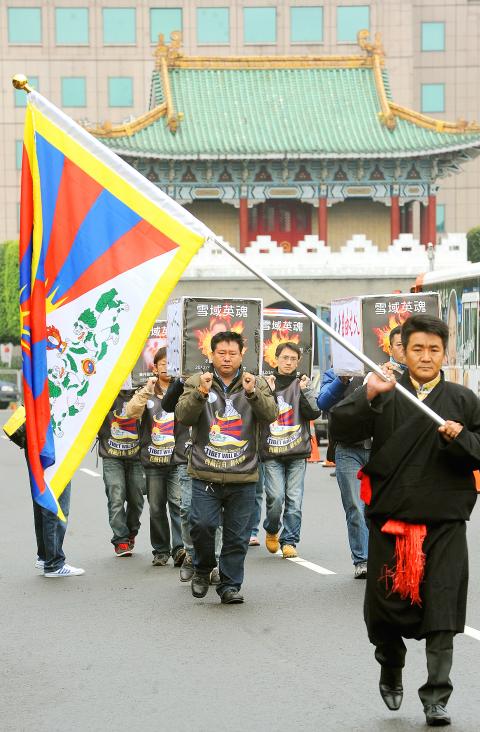Carrying model coffins and singing the Tibetan national anthem, dozens of Tibetans and Taiwanese supporters of Tibetan independence yesterday marched along Ketagalan Boulevard in Taipei and submitted a petition urging President Ma Ying-jeou (馬英九) to pay more attention to the state of human rights in Tibet.
The activists, who carried the cardboard coffins to symbolize the 28 self-immolations by Tibetans since March last year amid a renewed clampdown by Chinese authorities, condemned the Chinese government for its continuous repression of Tibet and reminded Ma of his previous promise to take an interest in human rights issues in the region.
“President Ma voiced his support for Tibet’s struggle for freedom when running for president in 2008. However, since then, he has not openly shown his support. Taiwan’s closer economic ties with China should not prevent our government from taking a strong stance on human rights in Tibet,” Taiwan Friends of Tibet deputy director Yiong Cong-ziin (楊長鎮) said.

Photo: Liu Hsin-de, Taipei Times
Amnesty International Taiwan board member Tashi Tsering, an Indian-born Tibetan-Taiwanese, said Tibetans had been fighting for religious freedom and their human rights in a peaceful way and that people were setting themselves on fire because the situation in the region had become unbearable.
“We need to defend our right to religious freedom and ask for the return of [Tibetan spiritual leader] the Dalai Lama,” he said.
“The fight for freedom and human rights in Tibet is not only for Tibetans ... the international community should join us in asking for change in China,” he said.
Police and security guards carefully monitored the group as it later marched from the Taipei Guest House to the Presidential Office to hand over a petition to Ma, calling on him to pay attention to human rights.
A staff member from the Presidential Office’s public relations division received the petition and promised to relay the group’s concerns to Ma.
Ma, who had expressed sympathy for Tibet’s independence movement during the 2008 presidential campaign, rejected a proposal later that year, after he had been elected, for the Dalai Lama to visit the country.
Yang Cheng-shin (楊正欣), a member of Taiwan Students for a Free Tibet, said the group hoped that the president would openly voice his concerns about China’s human rights situation and hold regular meetings with civic groups and human rights advocates to monitor the state of human rights in Tibet.
The group also invited the public to join a rally today in commemoration of the 52nd anniversary of the 1959 Tibetan uprising. The rally is scheduled to begin at 2pm in front of Zhongxiao Fuxing MRT Station.

Alain Robert, known as the "French Spider-Man," praised Alex Honnold as exceptionally well-prepared after the US climber completed a free solo ascent of Taipei 101 yesterday. Robert said Honnold's ascent of the 508m-tall skyscraper in just more than one-and-a-half hours without using safety ropes or equipment was a remarkable achievement. "This is my life," he said in an interview conducted in French, adding that he liked the feeling of being "on the edge of danger." The 63-year-old Frenchman climbed Taipei 101 using ropes in December 2004, taking about four hours to reach the top. On a one-to-10 scale of difficulty, Robert said Taipei 101

Nipah virus infection is to be officially listed as a category 5 notifiable infectious disease in Taiwan in March, while clinical treatment guidelines are being formulated, the Centers for Disease Control (CDC) said yesterday. With Nipah infections being reported in other countries and considering its relatively high fatality rate, the centers on Jan. 16 announced that it would be listed as a notifiable infectious disease to bolster the nation’s systematic early warning system and increase public awareness, the CDC said. Bangladesh reported four fatal cases last year in separate districts, with three linked to raw date palm sap consumption, CDC Epidemic Intelligence

Two Taiwanese prosecutors were questioned by Chinese security personnel at their hotel during a trip to China’s Henan Province this month, the Mainland Affairs Council (MAC) said yesterday. The officers had personal information on the prosecutors, including “when they were assigned to their posts, their work locations and job titles,” MAC Deputy Minister and spokesman Liang Wen-chieh (梁文傑) said. On top of asking about their agencies and positions, the officers also questioned the prosecutors about the Cross-Strait Joint Crime-Fighting and Judicial Mutual Assistance Agreement, a pact that serves as the framework for Taiwan-China cooperation on combating crime and providing judicial assistance, Liang

US climber Alex Honnold left Taiwan this morning a day after completing a free-solo ascent of Taipei 101, a feat that drew cheers from onlookers and gained widespread international attention. Honnold yesterday scaled the 101-story skyscraper without a rope or safety harness. The climb — the highest urban free-solo ascent ever attempted — took just more than 90 minutes and was streamed live on Netflix. It was covered by major international news outlets including CNN, the New York Times, the Guardian and the Wall Street Journal. As Honnold prepared to leave Taiwan today, he attracted a crowd when he and his wife, Sanni,